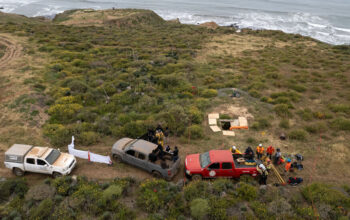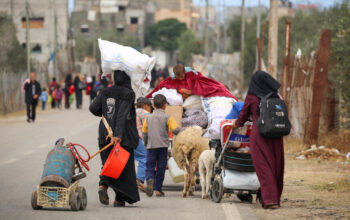
Details: Ukraine has advanced faster than expected and is moving to consolidate control over the recaptured territory. Ukraine’s military said it pushed into an additional 20 towns and villages in 24 hours and claimed to have recaptured nearly 200 square miles in the southern region of Kherson.
What’s next: The prosecutor general’s office in Ukraine is investigating possible war crimes in a recently liberated village near Kharkiv.
Allies: Ukraine’s success has encouraged European allies ahead of what is expected to be a hard winter of rising fuel costs. It will most likely increase pressure on NATO members to supply Ukraine with heavier weaponry.
Some countries are holding to the status quo. Yesterday, Jacinda Ardern, the prime minister of New Zealand, said that she thought her country would most likely become a republic in her lifetime. “But I don’t see it as a short-term measure or anything that is on the agenda anytime soon,” Ardern said.
The State of the War
Republicanism is more entrenched in Australia, which has a larger population of Irish descent. There, the queen’s death has created a political maelstrom.
Australia’s government suspended Parliament for two weeks to commemorate her death, the BBC reports, a historic protocol. The move prompted blowback, The Sydney Morning Herald reports, among politicians who feared the suspension would delay or weaken integrity reforms promised by Anthony Albanese, the prime minister. Here are live updates about the queen’s death.
Context: Fourteen former colonies retain the British sovereign as their head of state.
Caribbean: On Saturday, the prime minister of Antigua and Barbuda announced plans to hold a referendum on becoming a republic within three years. Barbados voted to remove the queen as head of state last year.
Scotland: New debates arose about the future of the independence movement.
England: Anti-monarchists are treading lightly. They see King Charles III as an easier target than his revered mother — but are aware that they risk alienating people during the period of official mourning.
Lebanon’s grinding electricity crisis
Oppressive blackouts have drastically changed the rhythm of life in Lebanon.
State-supplied power comes at random times, and for only an hour or two a day. Many residents have had to find coping strategies, my colleague Raja Abdulrahim reports from Beirut. Often, people do laundry and charge devices in the hours after midnight.
This profound electricity crisis is a subset of Lebanon’s worst economic crisis in decades, which the World Bank said could rank among the world’s three worst since the mid-1800s in terms of its effect on living standards.
Sept. 12, 2022, 7:03 p.m. ET
The blackouts also underscore the country’s sharp socioeconomic inequalities. Lebanese inflation rose to 168 percent in the year that ended in July, and unemployment is skyrocketing. Now, only a few people can afford diesel-powered backup generators to combat the heat and darkness.
Context: Lebanon has long had a dysfunctional electricity sector. But over the past year, acute fuel shortages have worsened power cuts.
THE LATEST NEWS
Asia and the Pacific
There’s an innovation arms race raging in the suburbs of Sydney, Australia. The front line: Garbage bins. The factions: humans and sulfur-crested cockatoos.
ARTS AND IDEAS
Student debt: No longer taboo
In the U.S., federal student loans are a legacy of the Cold War: They were first issued in 1958 in response to the Soviets’ launch of Sputnik. (The government was worried that Americans were falling behind in science.)
Now, Americans collectively owe $1.7 trillion in federal student loans, and the cost of college has nearly tripled since 1980, even when adjusted for inflation. Last month, President Biden announced a student debt forgiveness program that could cost taxpayers $300 billion or more.
Student debt has become a national dialogue, as more Americans have come to see it as a structural problem, rather than a result of poor personal decisions, and its stigma slips away.
It’s even cropping up as a narrative device in contemporary fiction. In The Times, Jennifer Wilson describes the typical loan-crisis novel as “a stymied bildungsroman for a generation who have been robbed of the possibility of becoming, sold a story that would cost them everything.”



